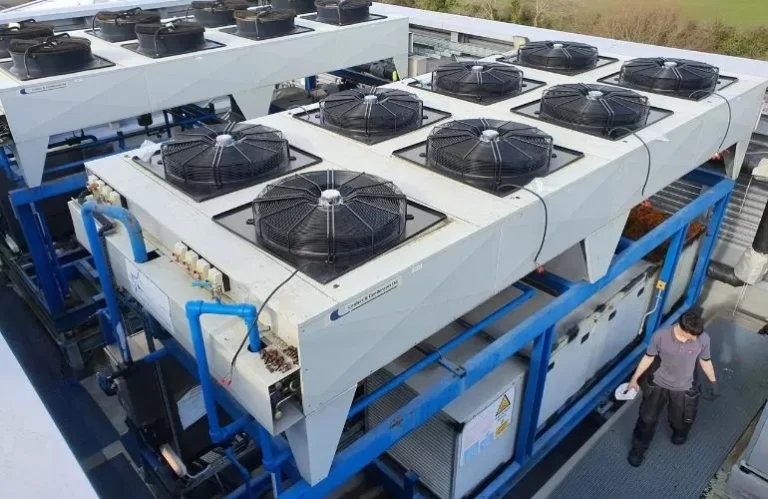Introduction
Hydraulic oil chillers are crucial components in industrial machinery, especially in sectors like construction, mining, and manufacturing, where equipment operates under intense conditions for prolonged periods. Hydraulic systems generate significant heat during operation, and without proper cooling, this can lead to equipment malfunction, reduced efficiency, and shorter lifespan of both the machinery and the hydraulic oil. Selecting the right hydraulic oil chiller is therefore essential to ensure smooth operations and prevent costly downtime.
Cooling Capacity
Cooling capacity refers to the chiller’s ability to remove heat from the hydraulic system. Underpowered chillers struggle to maintain optimal temperatures, leading to potential overheating, while overpowered units may result in energy wastage. The cooling load is usually measured in kilowatts (kW) or tons of refrigeration, and should be carefully matched to the machinery’s heat generation.
Type of Chiller (Air-Cooled vs. Water-Cooled)
- Air-cooled chillers: These are preferred in environments where water resources are scarce or where water usage needs to be minimized. They use ambient air to cool the hydraulic fluid and are generally easier to install and maintain.Air Cooled Chillers
- Water-cooled chillers: These are more efficient in hot environments, as they use water for heat dissipation. However, they require a constant supply of water, often necessitating the use of a cooling tower or water source, making them better suited for large, stationary operations.Water Cooled Chillers
Hydraulic Oil Viscosity
The viscosity of hydraulic oil plays a critical role in how much heat it retains. Thicker oils (with higher viscosity) typically hold more heat, necessitating more intensive cooling. Different machinery uses oils with varying viscosities depending on operating pressure and temperature, so the chiller must be selected based on the type of oil being used.
Fluid Filtration System
Hydraulic oil chillers often include integrated filtration systems to remove contaminants from the oil before it re-enters the hydraulic system. Efficient filtration ensures that the oil remains clean, reducing wear and tear on the machinery and extending the lifespan of both the oil and the equipment.
Chiller Redundancy
In heavy machinery applications, where downtime can be extremely costly, redundancy is often built into cooling systems. This means having an additional chiller or a backup system ready in case of failure. Including redundant chiller capacity can ensure continuous operation without interruptions, especially in critical processes.
Control and Monitoring Systems
Modern hydraulic oil chillers are often equipped with advanced control systems that allow precise temperature regulation and monitoring. Remote monitoring capabilities, PLC controls, and integrated alarms can help detect potential issues before they lead to equipment failure.
Temperature Control Precision
The precision of temperature control is vital for certain industries like plastics manufacturing or metalworking, where consistent hydraulic oil temperatures are crucial for product quality. High-precision chillers offer tighter control over temperature fluctuations, ensuring stable hydraulic performance even during extended operation.
Heat Recovery Potential
In some industrial setups, waste heat from the hydraulic system can be recovered and used for other processes, such as pre-heating materials or in building heating systems. Chillers designed for heat recovery allow companies to harness this otherwise wasted energy, improving overall energy efficiency.
Durability and Build Quality
Industrial environments can be harsh, and chillers must be designed to withstand extreme conditions, such as vibration, chemical exposure, and temperature swings. High-quality materials like stainless steel and corrosion-resistant coatings can significantly extend the chiller’s operational life in tough industrial environments.
Maintenance and Serviceability
Routine maintenance is crucial for the long-term performance of hydraulic oil chillers. Hydraulic systems are prone to oil contamination and overheating if not regularly maintained. Easy access to parts like filters, fans, compressors, and heat exchangers is vital to minimize downtime.
Conclusion
electing the right hydraulic oil chiller for heavy machinery is pivotal to maintaining optimal performance, extending equipment life, and ensuring operational efficiency. By thoroughly evaluating factors such as cooling capacity, chiller type, hydraulic oil viscosity, and operating environment, industries can make informed decisions that enhance system reliability and reduce operational costs.

